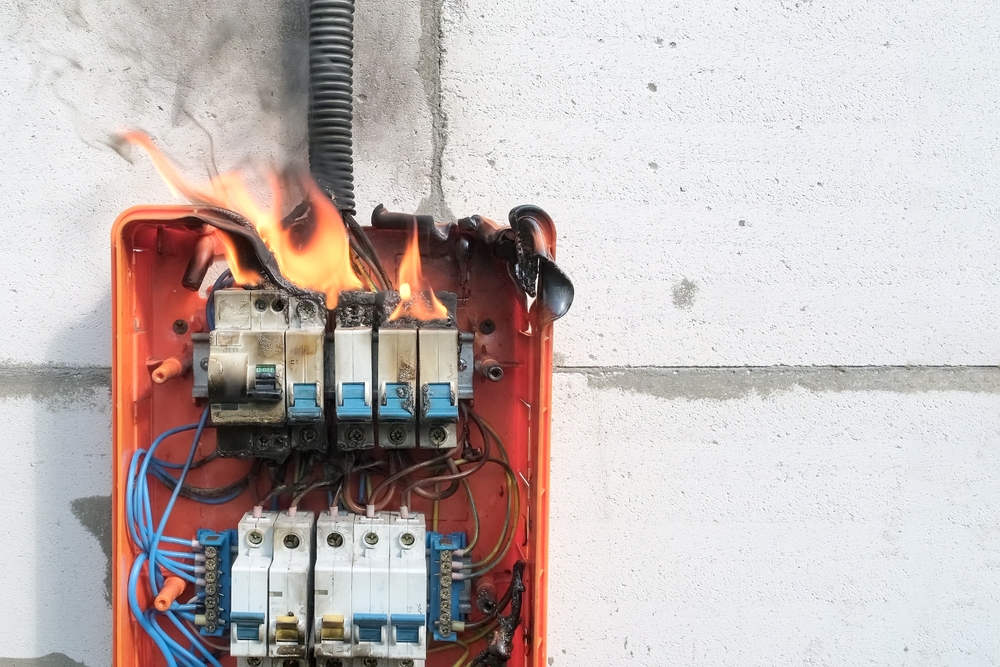What Is a Short Circuit?

We use electricity in our homes pretty much every day—whether we’re cooking food on the stove or powering an iPhone, electricity is fulfilling our daily needs. However, within the intricate networks of circuits and wires lies an electrical problem that many homeowners don’t notice until it’s too late: short circuits. Join us as we dive into the world of short circuits, exploring what causes them, what types there are, and more importantly, how to prevent potential hazards from happening.
Short Circuits Explained
A short circuit is a serious type of electrical accident that damages your electrical system. When you power on your electronics, electricity runs through wires and circuits. Sometimes, the electricity gets blocked, which causes a short circuit. Electricity needs to go somewhere, and if the wires that lead to power on your phone, TV, or lights are blocked or can’t find a pathway, then they take a pathway they’re not supposed to, called a “low resistance pathway.” When electricity travels through a low resistance pathway, that pathway cannot support the amount of electricity, causing a short circuit. Many people disregard short circuits, but it’s important to fully understand how they happen because they can spark and lead to electrical fires.
What Causes Short Circuits?
Unfortunately, there are many reasons why short circuits occur, and they happen to almost everyone. The most common causes of short circuits in residential electrical systems are:
- Old and faulty electrical wiring or connections.
- Loose connections/wiring or overloaded circuits
- Damaged appliances, devices, switches, lights, or other electronics.
- Moisture, pests, or other environmental factors.
- Water or foreign objects like nails or staples coming in contact with electrical wiring.
Keep in mind that there are more reasons why a short circuit happens, and that’s why it’s important to regularly check and inspect your electrical system for the aforementioned causes.
The Types of Short Circuits
1. Normal Short Circuit
A normal short circuit is when an electrical wire, or “hot wire” touches a neutral wire. In other words, electricity runs through a low-resistance pathway when it’s not supposed to.
2. Ground Fault Short Circuit
A ground fault short circuit is different because the hot wire touches a grounded part of the electrical system instead of a neutral wire. The grounded part could be a metal wall box, bare ground wire, or a grounded portion of an appliance.
Identifying Short Circuits
1. Frequent Tripping
If the circuit breakers are tripping frequently, that’s because of short circuits.
2. Burnt Smell
If you notice a burning smell or visible scorch marks near outlets or switches, then your electrical system needs to be checked immediately to prevent fire risks.
3. Flickering or Dimming Lights
A flickering light could indicate a dying bulb, but it can also indicate short circuits, especially if multiple lights or rooms are flickering.
How to Fix a Short Circuit
To fix a short circuit, make sure that you take all the protective measures to ensure your safety from electrical risks. You can follow these steps:
- Turn off power to the affected circuit.
- Identify and rectify the cause of the short circuit, such as replacing damaged wiring or resetting a tripped breaker.
- Test the circuit to ensure proper functioning before restoring power.
DIY steps for electrical writing are tricky, and sometimes very dangerous. When in doubt, consult a qualified electrician like the ones at T. Webber.
How to Prevent Short Circuits
Every homeowner wants the best protection for their home and family. Follow these tips to minimize the risk of short circuits in your home:
- Avoid overloading circuits by distributing loads evenly.
- Use surge protectors and ground fault circuit interrupters (GFCIs) where necessary.
- Regularly inspect and maintain electrical components, including outlets, switches, and wiring.
Get Help With Short Circuits at T. Webber
At T. Webber, we believe it’s important to understand short circuits, how to identify them, and ways to fix them to ensure the safety of your home. Short circuits can happen for a number of reasons that may be hard to identify at first. But when you notice frequent tripping, a burning smell, or flickering lights in your home, then you are most likely dealing with short circuits that require immediate attention. Call T. Webber to help protect your home from electrical hazards—our team of professional electricians is ready to help!




